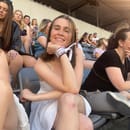Bragging about yourself can be very uncomfortable. Especially being a woman, adopting the modesty topos is natural, but it can be limiting. The struggle to just acknowledge, further, and emphasize my involvement and academics proved to be a challenge when crafting my first cover letter. So much so that I nearly gave into the devil on my shoulder telling me that the words “optional” held real merit concerning if I had to include a cover letter in my applications. Spoiler alert: you should definitely have one. I come here today humbly offering my advice for approaching cover letters as someone who had a difficult time constructing one, to the point that it was an obstacle in applying. Because although it felt really scary, it is not as daunting as it might seem.
The Cover Letter Formatting
Treat the formatting of your cover letter as if you are writing an email. Put the date, then in the next line the company’s name, then below that Re: position title. This immediately asserts that you know what you are applying for and addresses the organization directly. After providing this heading, put a line between this and what comes next: Dear recruiting team. I like to customize this very generic starting line by putting the name of the company, but if you have a point of contact to address this to that is even better. Continuing with this email formatting, at the end of your cover letter there should be some kind of polite closing statement, i.e. sincerely, and then your name.
The Intro
Your first paragraph should start with a single sentence containing your name, university, major, and year. This serves as a simple introduction to who you are and does not need to be overthought, just lay out a very simple presentation of who you are as a candidate. In the next sentence I swiftly move into why we are here: the job position. Emphasize the role you are seeking, citing its exact name, and your excitement towards applying.
Body Paragraphs
The actual meat of the cover letter, emphasizing my roles in different positions and being particularly braggadocious about my skill set, had me stumped for a while. I recommend taking a good look at your resume and thinking about how you can group things. For example, in my cover letter I have paragraphs emphasizing technical skills and coursework, leadership roles, and professional experience. I find that going topic to topic enables a better flow and ability to group the skillsets you have garnered from each experience as there tends to be overlap.
When I say professional experience, I mean working as a counselor and a waitress – two things that have nothing to do with my future career prospects but are vital to include nonetheless. This offers a reminder to not deflate your involvement or think that because something is not “directly related” to the role it should not be included. An important part of the cover letter is not just saying what you did in the roles but what you learned. Being a camp counselor is not intrinsically related to the computer science field, however the problem solving, teamwork, and organizational skills sharpened in this experience definitely apply. Demonstrating that you can work with others, even if it isn’t in the capacity of some high-end internship, is really important. Service jobs like waitressing or retail might not seem like a big deal, but these interpersonal, soft skills are sought after and look great on a resume and cover letter.
Backtracking to deflating oneself, I advise you to not underemphasize your accomplishments for fear of coming off as boastful or arrogant. Because I promise that you are just as impressive as you are making it seem in this cover letter, it just can be a bit intimidating to have to articulate it on paper. Think of how someone else with the same credentials as you could explain different positions and experiences in such an amazing way that they would get the job over you, just by virtue of not holding back. So do not hold back, do not be modest, treat this as a brag sheet and overemphasize where you are involved and amazing.
The Ending
My template ends with two paragraphs: one illustrating why I am drawn to the company and another thanking the recruiters for their time. In the former, I look at the job opportunity description and what the company focuses on, doing further research if necessary until I find something I connect to. Whether it be an innovative approach to projects or a devotion to diversity find something that interests you about the company and speak to this point. Displaying interest is an important part of the cover letter, to let them know that this is not just another application (even if it might just be one of many). Illustrating your investment in the company and the opportunities they can provide is the cherry on top after showing how you are a great fit for the role.
Finally, I end my cover letter with a sentence thanking the reader for their consideration and another expressing my excitement for the opportunity to make a difference within the company. This is very much an up to you ending, however I find that being succinct while conveying your appreciation and enthusiasm is a great way of closing out your cover letter. As I said in the beginning, close out with a polite email-ending phrase (I use sincerely) and your full name. Make your best effort to have the cover letter as a single page, if you are struggling I would reduce the font to an 11 rather than 12. Good luck with your application endeavors, you got this!!



